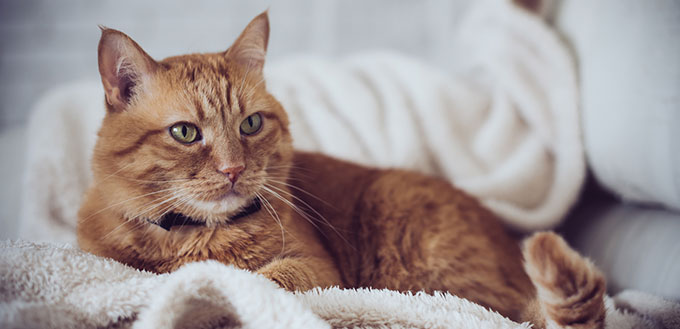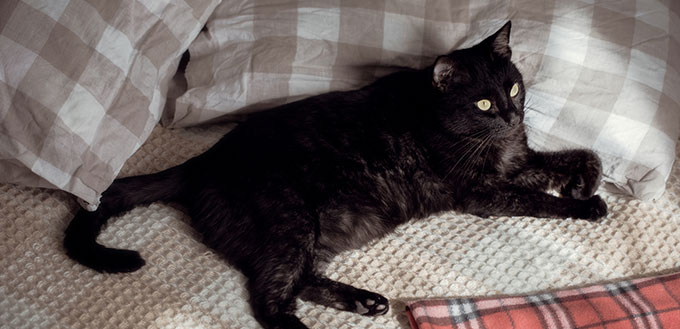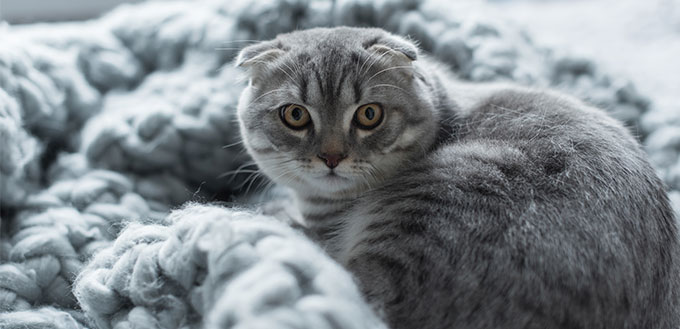One of the best things about having a cat is observing their behavior. It can be cute, it can be funny, but, sometimes, it is just a mystery. A common example of strange behavior is sucking on blankets. Whether you find this behavior cute or worrying, it is always a good idea to strive to understand it. In the worst case scenario, it can help you diagnose a serious medical issue, but at the very least you will get to know your cat a little better.
Kittens and Blankets
Blanket sucking is most common in kittens and, as you might expect, it has a lot to do with suckling. Much like how babies enjoy sucking their thumbs, kittens might suck on blankets, or other soft items. Kittens may be particularly attracted to suckling on wool and other wool products.
While babies often explore the world by biting, sucking and eating things they probably shouldn’t, kittens usually only suckle on wool and blankets when they have not been successfully weaned. As a general rule, kittens should live with their mothers for at least the first 8 weeks of their lives. During this time, they live off their mother’s milk, but will slowly need to be introduced to solid food.
Related Post: Kitten Foods for Your Cat
They often choose blankets, wool, and other fabrics because they mimic their mother fairly well due to it’s warmth and texture. If you think your cat may be trying to suckle, look out for other attempts to find replacement ‘nipples’, such as sucking your earlobes. Other signs your kitten has been prematurely removed from their mother includes:
- Aggressive behavior
- Fearful behavior
- Difficulty with naturally learned behaviors, such as grooming
- Frequent illnesses due to a weakened immune system
Not all kittens that are removed from their mothers before 8 weeks will keep trying to suckle on a blanket, but premature separation from their mother can be a cause of blanket sucking. It is probably best to avoid adopting kittens before the age of 12 weeks, but if it cannot be avoided, make sure to discuss with a vet if you need to continue the weaning process yourself.

Your Adult Cat and Blankets
When you think about it, a kitten suckling on a blanket makes some sense, but when an adult cat sucks on a blanket it can seem to be even more of a mystery. It is less common for adult cats to suck on fabric, but it is not unheard of. Usually, a kitten who sucks on blankets will naturally grow out of the habit, but some cats continue into adulthood.
It can be easy to worry about your cat sucking on blankets, especially if you don’t understand it, but the behavior itself is actually quite benign. However, there is a risk of pica if they swallow an excessive amount of thread from the blanket or other inedible items, which can cause stomach issues or vomiting. If your cat sucks on blankets, check the blanket to make sure they aren’t biting off threads and watch out for other symptoms of gastrointestinal issues, such as:
- Diarrhoea
- Constipation
- Reduced appetite
- Vomiting
- Lethargy
Pica is a serious issue, but don’t be alarmed, blanket sucking does not automatically result in pica. It is much more important to understand why your cat is sucking on blankets in the first place. If there is a serious reason, such as fear or a medical problem, then you will want to know about it in order to deal with it.
Related Posts: Cat Food for Sensitive Stomachs and Cat Food for Constipation
Why Does Your Cat Suck On Blankets?
We’ve already discussed that kittens are most likely to suckle due to their weaning experience, but there are quite a few other reasons for cat blanket sucking that we should explore. If you understand why your cat wants to suck blankets, you will able to resolve the cause, which is much more important than simply stopping them. After all, you may even find that the behavior is actually the expression of something positive, rather than something negative that needs to be fixed.
- Habit
An adult cat may suck blankets out of habit from when they were young, possibly because they were removed from their mother too early. This isn’t much to worry about, however, as, if they no longer need to be weaned, a habit is just a habit. As long as they are not digesting any of the fabric, and you don’t mind them ruining your blanket, there is no harm in your cat sucking at it.
- Relaxation
Similarly, your cat may continue to suck on blankets, or even pick up the habit, simply because it is comforting. If your cat usually sucks blankets when they are happy, content or relaxing, such as chilling on your lap or while falling asleep, the behavior is probably not a problem, and is, in fact, a pleasure. You may still want to do something about it if you have concerns about pica, but you could also leave them to enjoy their blanket sucking time.
- Their Breed
Unfortunately, we still don’t entirely understand how genetics may be affecting your cat’s urge to suck on blankets and other fabrics, but it is known that some breeds display this behavior more than others. If you have an Oriental breed, like a Siamese, they are more likely than other cats to suck on blankets. Our current best guess is that it has something to do with their weaning needs as Oriental breeds have longer weaning periods than other breeds.
- Their Environment
Like grooming and licking, sucking is also a common stress-relief behavior for cats. This means that an adult cat who picks up the blanket sucking habit may be responding to stressors in their environment. Think about any recent life changes, particularly from the perspective of your cat. This may be something obvious and big, like moving house or being threatened by another pet in the household, but could also be something small that bothers your cat, like a loud air conditioning unit placed too close to their private, personal space.

- Anxiety
Cats can also just generally be anxious animals. They don’t like to feel trapped or threatened, and can be very territorial. Cats can grow up to have anxious personalities, particularly if they have experienced insecurity or even abuse in the past. Look for other signs of anxiety, such as hiding, excessive licking, or aggression. If you have adopted an adult cat that sucks blankets and shows signs of fearfulness, talk to a vet or behaviorist about how you can help soothe their anxieties.
- Bereavement
Cats may not be as open and friendly as other pets, but when they bond to a loved one, they bond closely. This can mean they take it hard when someone in their family passes away. It could be a fellow cat, another pet they’ve lived with their whole life, or a human family member. Just as humans can struggle with grief, a cat who is missing a loved one may turn to sucking for comfort.
- Pain
The most urgent cause to consider is pain. Just as sucking may be a comfort mechanism against sadness or stress, your cat may also start to suck blankets for comfort when they are in pain. If your cat suddenly starts sucking on blankets, or their habit increases significantly, look for symptoms of other potential health concerns, such as wounds, bumps, lethargy, and limping. If you are worried, it is always best to take your cat for a check up at the vet.
How To Stop Your Cat From Sucking Blankets
If your cat sucks blankets simply as a happy habit when they are relaxed, you may not want to take this activity away from them. However, if you think the cause is negative, you are worried about pica or you are simply sick of your cat ruining your blankets, there are some things you can do to help.
- Create a stress free environment
If you suspect that they are sucking blankets because they are stressed or anxious, it is a good idea to focus on creating a comfortable, relaxing environment for your cat. Make sure they have their own personal space, hiding areas and perches, a reliable routine, and quality bonding time.
Related Posts: Best Cat Houses and Cat Condos for Kitties
- Designate a sucking blanket
If your cat does not have a blanket sucking problem and your only concern is the damage they are doing to your soft furnishings, you can consider designating a specific blanket for them to suck. This particularly works if you think the habit is a positive habit that you don’t want to take away from them.

- Redirect their behavior
Whether you want to redirect the behavior to a specific blanket, or if you want to end the behavior altogether, you can use behavior training to redirect them away from blanket sucking. This generally involves you removing the blanket as soon as they start sucking, redirecting them to another activity or blanket, and then rewarding them to reinforce that new behavior. Don’t forget to consult a professional if you need help.
- Take them to the vet
Most importantly, you can take them to your veterinarian. This is crucial if you think pain is involved as they may need a diagnosis, but a vet can also help you with behavior training, assessing the cause of the sucking, and other good tips and advice.
Sources:
- Ken Lambrecht, DVM, Is Your Cat Suckling as an Adult?, Pet MD
- JaneA Kelley, Why Do Cats Suck on Blankets? 5 Reasons, Catster





